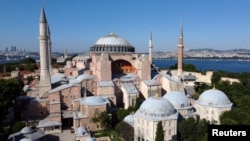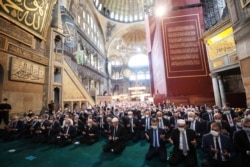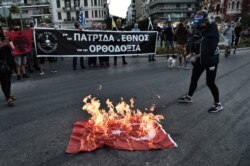Turkey's decision to convert the ancient Hagia Sophia monument back into a mosque has sparked a war of words between Athens and Ankara. However, as Greece intensifies its diplomatic scramble to slap sanctions on Turkey, Greek businesses have launched a campaign to boycott goods and services from the neighboring country.
Vassilis Korkidis, a leading representative of commerce in Greece, is blunt about the need, as he puts it, to strike back at Turkey.
We recognize the ongoing works and efforts of the government to counter the recasting of Hagia Sophia, he said. However, until that materializes into something concrete, Korkidis said, Greek businesses should waste no time in boycotting trade with their Turkish partners.
Even on a personal level, he says, consumers should follow suit. They can do so immediately, he said, boycotting Turkish goods, which bear the numbers 868 and 869 on the barcodes of imported products.
Despite age-old animosity between the two countries, trade relations have grown substantially in recent years. Greece’s annual exports to Turkey total about $1.6 billion, significantly more than the $1.2 billion in imports from Turkey.
Whether Greeks will heed the trade boycott remains unclear, especially as the economy here has been thrown into chaos by the COVID-19 pandemic.
However, the anger, sadness and resentment toward the Hagia Sophia recast weighs heavily in this largely Eastern Orthodox country — so much in fact, that experts say any short-lived trade gain is offset by bigger losses.
Korkidis explained, "We may enjoy a generous trade surplus, he says, but when you factor in the resources that Greece has to pull together to fend off continued flows of illegal migration from Turkey, and the huge military costs now racking up to safeguard against Turkish provocations — well all of that wipes out any semblance of a surplus."
The issue of Hagia Sophia is just the latest of a string of crises Greece is facing from its fellow NATO member, Turkey. Relations have been aggravated for years over land and sea rights in the Aegean, as well as thousands of illegal migrants continuing to stream into Greece from Turkey.
In recent weeks, also, tensions have soared as Turkish President Recep Tayyip Erdogan vowed to begin drilling for oil and gas in waters Greece considers its own. Greek business associations say they are already reaching out to partner organizations across Europe to institute build an even broader boycott against Turkey.
It is clear that the West is becoming increasingly unnerved by the actions of Turkey, Korkidis said. It is high time, he said, that Erdogan’s government stops using cultural issues to advance its political agenda.
The trade boycott is just one of many grassroots movements and protests, swelling in Greece.
On Sunday, alone, church bells tolled anew across the nation while tens of thousands of people packed into houses of prayer, singing hymns in honor of the Hagia Sophia, the seat of Eastern Christianity for about a thousand years before Ottoman Turks conquered its host city, then known as Constantinople.
In more worrying signs, though, teams of far-right nationalists fanned out across a city in northern Greece, torching a Turkish flag. The Greek government condemned the move. Still, it stoked nationalist and patriotic passions with a fresh round stinging remarks against the country’s age-old foe by Prime Minister Kyriakos Mitsotakis.
He said Turkey is a troublemaker threatening peace and security in the region, he says, but we have shown, that we can defend our borders, the European Union’s frontiers.
Greece believes the Hagia Sophia conversion is part of a bigger plan by Turkey to reassert itself as a regional and energy superpower.
Turkey says Greece is significantly overreacting. Even so, Greece insists it is not taking any chances, keeping its forces on code-red alert, ready to wage war if further provoked on any front.






